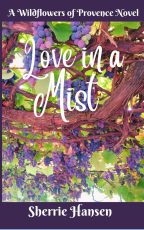Today would have been my Grandma Lorna Miller Hansen’s 120th birthday. She was born in 1900 and died in 2000 at one hundred years of age. I always thought of her as my Bohemian grandma. When I filled out family nationality charts in grade school, I was told that she was 100% Bohemian, which meant my dad was half Bohemian and I was a quarter Bohemian. But the reality was, she was half Bohemian and half German. So began the curiosity that sparked my new mystery, PLUM TART IRIS, which is dedicated to Grandma Hansen and her mother, my great-grandmother, Mary Eukel Miller Danielson, who we called Grandma Danny.

I knew my Grandma Danny until I was a young teenager. She was very precious to me, and very proudly Bohemian. I can still remember watching her make homemade noodles, sweet dough, and kolaches. She had large, strong hands, and was famous for doing cross stitch so precisely that it was as beautiful on the backside as it was the front. When I knew her, she lived in Minnesota, next door to my Grandma Hansen in a trailer ringed in snow-on-the-mountain and Johnny Jump-Ups. When my dad was young, she lived in St. Ansgar, Iowa, where I now own a B&B and Tea House.
My Great-Grandpa Miller died of cancer when he was a young man. My dad never knew him, so rarely spoke of him, and I never questioned but that he was Bohemian, too. When I went to live in Germany when I was twenty, no one mentioned that I was part German. I was there for three years and had no idea that I had roots in the German soil and culture. When I came home, my family fell in love with the jaegerschnitzel and homemade spaetzle noodles I prepared. When we adopted German food as our preferred holiday meal, we joked about how odd it was that we preferred it over longtime family favorites even though we had no German blood.

I should have known something was amiss, but no one in all those years had ever cooked us German food, or talked about German traditions, or even mentioned anything German.
As I got older, I finally realized that the surname Miller was not Bohemian, started to question my dad about his heritage, and found out that his Grandpa Miller was a migrant farm worker – German – who came to the Eukel farm – Bohemian – looking for work. He was hired and told he could live in the barn. They were not happy when he fell in love with their daughter. Although they married and had four children, it was evidently easy to forget his contribution to our family tree and pretend the whole episode never happened when he died.

This was my first clue that the enmity that has impacted German and Bohemian history for centuries had touched my family. My curiosity led me to research historical documents from different periods, to start plotting a book set in Bohemia, and eventually, to plan a trip to the Czech Republic where I was able to see the land from where my ancestors immigrated and learn more about my heritage.

I chose today as the release day for PLUM TART IRIS, my first Wildflowers of Bohemia Mystery, to honor my ancestors, and the secrets and surprises that are part of my heritage. What happens in Plum Tart Iris is purely fictional, but it was sparked by a fascination with my own family’s history. Whether you have a bit of Bohemian blood, a bit of German blood, both, or neither, I think you’ll enjoy taking a look at the history of two families who lived in Bohemia when World War II came to an end, and how what happened impacted the lives of the generations that followed.























9 comments
Comments feed for this article
May 26, 2020 at 7:46 am
Jeannie
Another interesting story… thank you so much
LikeLiked by 1 person
May 26, 2020 at 11:40 am
Sherrie Hansen
Thank you! I’m very excited to hear what people think of Plum Tart Iris!
LikeLike
May 26, 2020 at 9:38 am
Susan Joyce
Wonderful roll out for your new book release. Why am I not surprised? Plan to get my personally signed copy this Thursday! Was wondering how I was going to be able to finish Seaside Daisy without regretting there is no more of it to read. Now I can slip right into another adventure by a fabulous author!
LikeLiked by 1 person
May 26, 2020 at 11:45 am
Sherrie Hansen
I’m sorry to say that I won’t have paperbacks in stock for a little while yet, – Amazon is being slow with my proof copy.
LikeLike
May 26, 2020 at 7:13 pm
Virginia Haase
So looking forward to reading your newest book! Seaside Daisy was superb!
LikeLiked by 1 person
May 26, 2020 at 8:42 pm
Sherrie Hansen
Thank you so much! I’m so excited for people to read Plum Tart Iris. 🙂
LikeLike
October 1, 2020 at 11:57 am
Colorful Sisters
Really great content !
LikeLiked by 1 person
October 1, 2020 at 8:33 pm
Sherrie Hansen
Thanks – I appreciate it! Thanks for the follow!
LikeLiked by 1 person
October 2, 2020 at 9:24 am
Colorful Sisters
of courseee
LikeLike